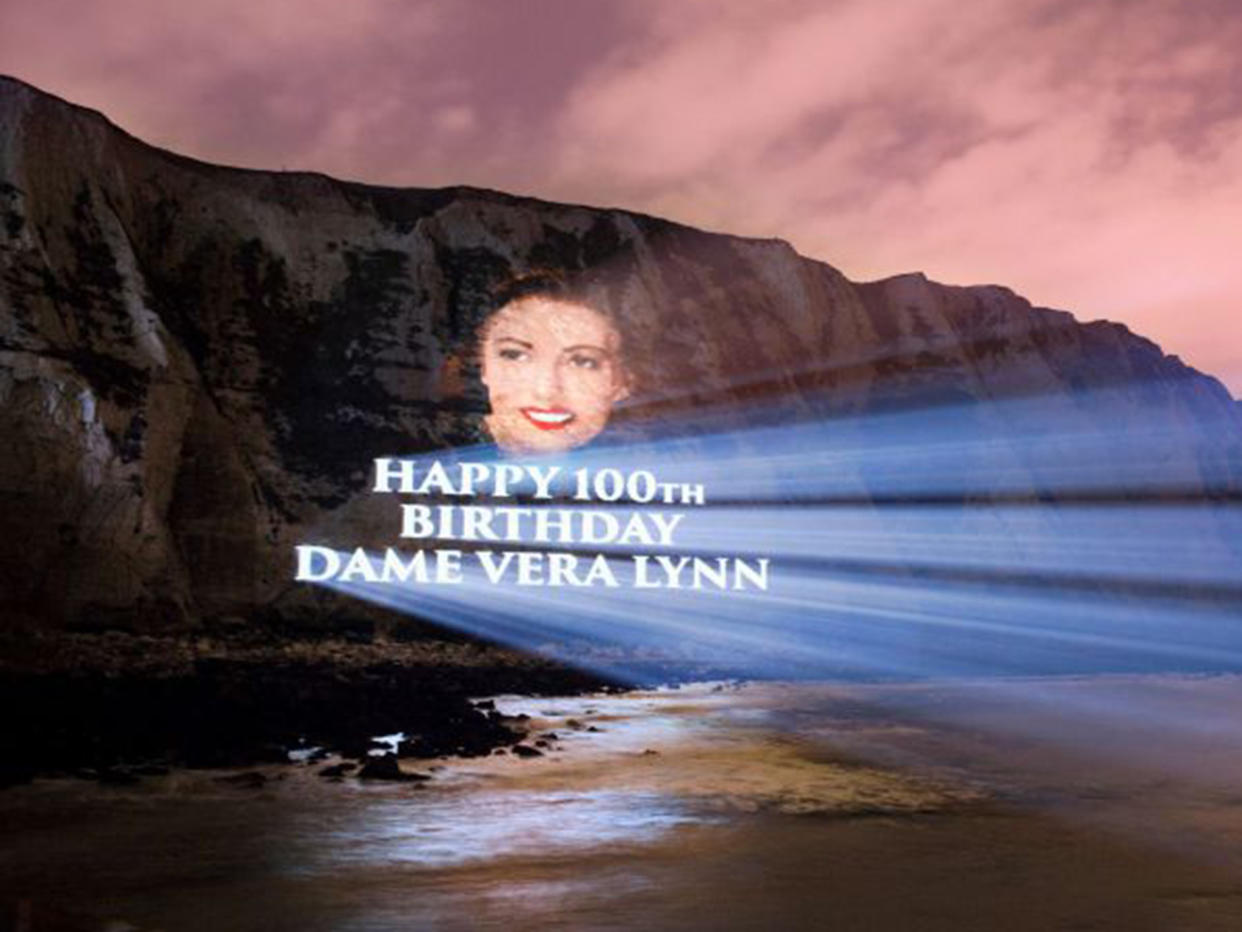Dame Vera Lynn is 100 – but sadly her songs about fighting the far right are more relevant than ever

Dame Vera Lynn, the “Forces’ Sweetheart” who helped keep morale high amongst British troops and those on the home front during World War II, turns 100 today. As our brave fighting men and women faced down fascism, and their loved ones at home worriedly awaited their return, Dame Vera promised that they would one day meet again and that, once liberty triumphed, there would be bluebirds over the white cliffs of Dover. After all, she sang, there will always be an England.
On the centenary of her birth, Dame Vera’s lyrics and legacy are more poignant than at any point since Victory in Europe Day back in 1945. The Western world once again faces a surging nationalism. From the xenophobia stoked by Brexit to the election of Donald Trump to the very real possibility that Marie Le Pen could win the French presidency, 2017 seems a lot more like 1937 than many of us would like to think.
Dame Vera’s songbook, with her blind patriotism and some hopelessly dated lyrics (“the empire too/we can depend on you”) seems an odd soundtrack for progressivism. Yet her songs and story offer hope and inspiration to those of us hoping to once again stem the rising tide of fascism.
Born Vera Welch in East Ham in 1917, Dame Vera began performing at the age of seven and released her first major hit, “We’ll Meet Again,” in 1939. The lyrics fit the time in a way few songs in history have, striking a chord with troops deploying to the continent and their sweethearts keeping the home fires burning. She had her own radio show which broadcast throughout Britain and into Europe, and toured military camps around the world, most notably in Burma – braving some of the worst fighting the British military saw during the war to boost morale amongst the troops. “I reminded them of their sisters, their sweethearts and their wives they had left behind, and what they were fighting for,” she told the Telegraph in 2014.
And so she reminds us of what we fight for today. Many have drawn parallels between Neville Chamberlain’s policy of appeasing Hitler and Theresa May’s warm embrace of Donald Trump. Nationalism once tore Europe apart and, with the rising tight of reactionary populism throughout the European Union, it threatens to do the same today.
Outright comparisons between the Second World War and today can trivialise the atrocities of Nazi Germany. Still, reflecting upon the valiant fight our ancestors waged to keep us not only free but open to the world reminds us that liberty is tenuous and democracy is not guaranteed. The country – nay, the free world – came together to preserve freedom for us once before, and Dame Vera provided the soundtrack.
It’s her uniting spirit that is most striking. Universally beloved, Dame Vera’s music and the history it now invokes remind us that we truly have more in common than what divides us. The war united Britons and Americans of all political persuasions around their love of democracy and freedom. At a time when our nations seem more divided than ever and it feels parts of our electorate are rejecting liberal values, remembering the sacrifices our forbearers made is important.
Dame Vera has never revealed her political predilections, and for good reason; she sang for the whole country, regardless of party or ideology. Patriotism, in her songs at least, knows no party. So few things unite us like that now, yet ironically we’ve never needed more uniting than when Dame Vera recorded these songs.
If this sounds hopelessly optimistic, it is. That’s exactly what Dame Vera’s songs were. From the understated “London Pride,” which speaks to the resilience of Londoners (and the flowers that bloomed in bombed-out lots) to the defiant “There’ll Always Be an England” which can rouse even the most hard left heart to wave the Union flag when asked “red, white, and blue/what does it mean to you?”, these songs promise that, even in the midst of the Blitz, this too shall pass, if only good men and women stand up for what’s right.
These are patriotic songs, it’s true, but they’re not nationalistic songs. Taken in the context, even lines like “surely you’re proud/shout it aloud/Britons awake!” are clearly repudiations of authoritarianism and proclamations of the virtues of liberal democracy – which is what Britain stood for then and, despite a few stumbles, stands for now. As such, they are just as relevant to those of us fighting against Trump, Le Pen, and the more pernicious supporters of Brexit as they were to our great-grandparents.
It is unfortunate that on her 100th birthday Dame Vera Lynn’s songs are still politically relevant and not just a catalogue in the Great British Songbook. But to honour her legacy, and the legacy of all those who gave their talents to preserving democracy and liberty for us, we should heed the unifying optimism of her lyrics and silken vocals. Dame Vera Lynn not only represents the best of Britain, but is a reminder of what British and Western values truly are. On her birthday, we can best honour her by living up to the example she set.
Happy birthday, Dame Vera.

 Yahoo News
Yahoo News 